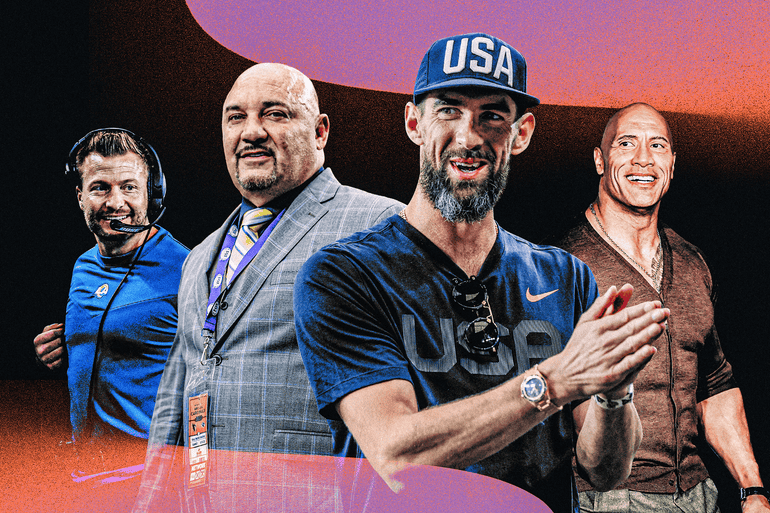Athlete mental health it was a little before 11 p.m. on the last day of May when Michael Phelps, the most decorated Olympian in history, sent a text to a close friend:
“Went to a dark place today…Going to bed now…just wanted to keep you in the loop … love ya homie.”
The message went to Jay Glazer, Fox NFL Insider and longtime MMA trainer, who immediately replied with encouragement: “I love you for telling me! Need to talk? … PROTECT YOUR FORTRESS!!!”
This exchange wasn’t unusual. In fact, it’s part of a growing bond between Phelps and Glazer—two men who have battled anxiety and depression and are now helping reshape the conversation around athlete mental health.
This exchange wasn’t unusual. In fact, it’s part of a growing bond between Phelps and Glazer—two men who have battled anxiety and depression and now lean on each other during their darkest moments. Their story is also reshaping the way we view athlete mental health.
The Rise of “Battle Buddies” in Athlete Mental Health
The friendship began over a decade ago during a Subway commercial shoot but deepened in 2022 when both openly discussed their struggles with athlete mental health. Their regular check-ins—texts, calls, and video chats—eventually grew into a larger community of support.
Phelps calls it his “mental health buddies” network, while Glazer calls it “battle buddies.” The group now includes top athletes and coaches such as Sean McVay, Dan Quinn, Andrew Whitworth, Mark Kerr, Travis Kelce, and even Dwayne “The Rock” Johnson.
“These are some of the baddest dudes on the planet,” Glazer said. “And yet they have cried, vented, and leaned on each other when things got dark.”
Why Athlete Mental Health Matters
The group highlights a powerful truth: strength is found in vulnerability. Research shows that social connection is one of the most protective factors for athlete mental health. For men, especially athletes conditioned to show toughness, opening up about depression and anxiety can be life-changing.
Clinical studies suggest that peer support can:
- Reduce feelings of isolation.
- Lower risk of self-harm.
- Improve resilience during high-stress periods.
- Encourage healthier coping strategies instead of substance use.
For Glazer, reaching out was once unthinkable. He admitted to masking pain with alcohol and painkillers, hiding depression out of shame. But moments of honesty—like finally telling his longtime friend Michael Strahan about his struggles—helped him realize that opening up strengthens, rather than weakens, relationships.
“You can impress people with your strengths,” Rams coach Sean McVay explained. “But you connect with them through your weaknesses.”
The Ripple Effect on Athlete Mental Health
This “battle buddy” system has become more than a support group. It’s a movement redefining mental toughness and athlete mental health. Athletes who were once reluctant to show emotion now check in on one another, reinforcing the idea that mental health is as vital as physical health.
For example:
- When Glazer spiraled, McVay and Phelps called him multiple times a week.
- After being fired in 2020, Dan Quinn was surprised with a Zoom call of 50 former players and colleagues sharing their support.
- Mark Kerr, once struggling with addiction and shame, found healing through training and conversations with Glazer.
- Johnson leaned on Glazer after losing his father, finding comfort in remembering the positive moments instead of guilt.
Together, they’ve created a safe space where vulnerability is celebrated and athlete mental health is prioritized.
A Lesson Beyond Sports
While this network consists of athletes and celebrities, the lesson applies to everyone. Whether you’re a student, a parent, or a professional, having “mental health buddies” can make a real difference. Even a short text, a quick call, or listening without judgment can pull someone out of despair.
As Phelps said: “When we’re in that dark place, we feel like we’re all alone. But having a handful of shoulders to reach out to changes everything.”
Frequently Asked Questions (FAQs) –
1. What are “battle buddies”?
Originally a military term, it refers to trusted partners who support each other through struggles. In this context, athletes use it to describe their athlete mental health support group.
2. Why is peer support important for athlete mental health?
Peer support reduces isolation, encourages openness, and provides practical coping strategies. Studies show it can significantly improve emotional resilience.
3. Do you need a professional therapist if you have “battle buddies”?
Yes. While peer support is powerful, it does not replace professional care. Therapists and psychiatrists provide clinical treatment for conditions like depression, PTSD, and anxiety.
4. What’s the biggest takeaway from the Phelps-Glazer network?
That vulnerability is strength. Sharing struggles not only eases personal burdens but also deepens trust and connection—making athlete mental health and overall wellbeing stronger.







